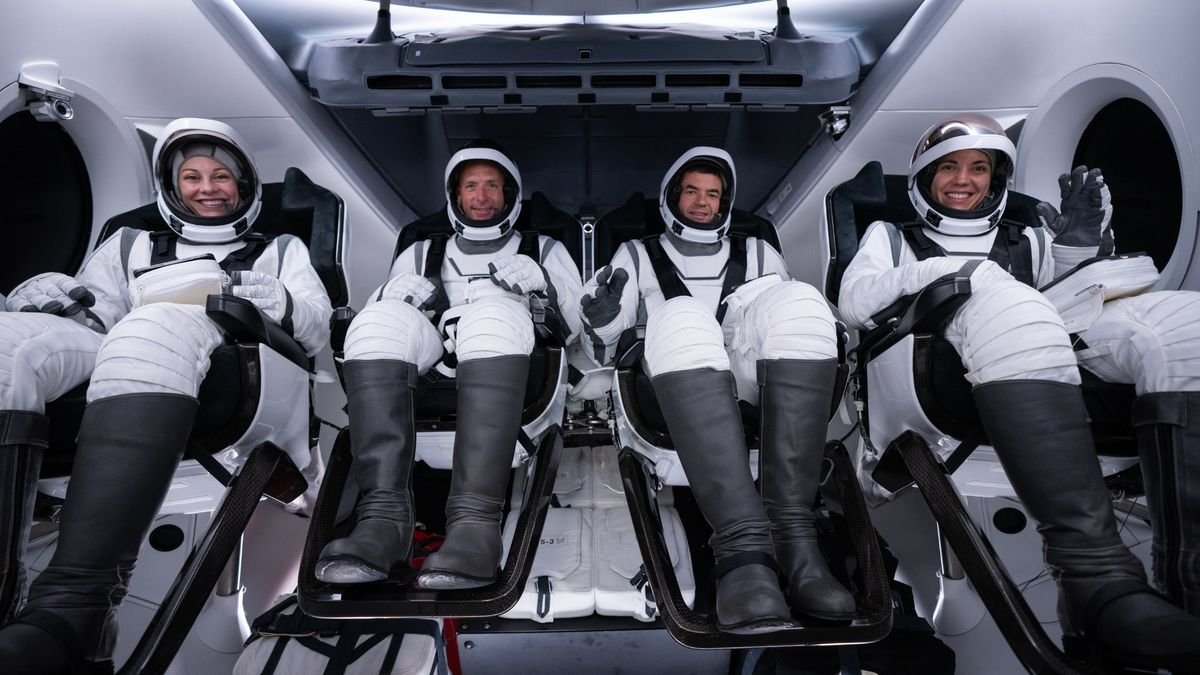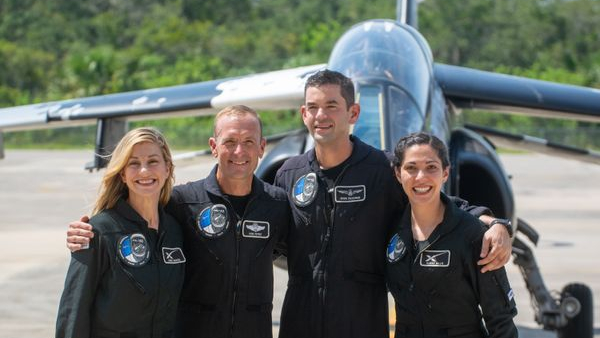
CAPE CANAVERAL, Fla. — The four astronauts of SpaceX’s private Polaris Dawn mission that will perform the first commercial spacewalk are taking delays to their launch in stride.
The mission was initially slated to launch Aug. 27, but was delayed to Aug. 28 due to technical issues. Polaris Dawn was then postponed two more days, to no earlier than Friday, Aug. 30, due to splashdown weather concerns for the end of the mission. Now, the launch depends upon the completion of a mishap investigation required by the Federal Aviation Administration, which has grounded the Falcon 9 rocket after a failed booster landing attempt at sea, following a SpaceX Starlink launch early Wednesday.
Despite the multiple delays, the crew remains patient and focused on their mission. “Sometimes, the hardest journeys require the most patience, and we’re ready to wait for the right moment. We know many have traveled to see the launch, and we’re grateful for your support,” the mission’s commander and financier Jared Isaacman wrote on X late Tuesday (Aug. 27).
Isaacman explained that the delays that took place prior to the beginning of the FAA’s investigation into SpaceX’s Falcon 9 failure were made due to the nature of Polaris Dawn’s unique mission.
“Our launch criteria are heavily constrained by forecasted splashdown weather conditions. With no ISS rendezvous and limited life support consumables, we must be absolutely sure of reentry weather before launching. As of now, conditions are not favorable tonight or tomorrow, so we’ll assess day by day,” Isaacman wrote in the post.
Other crewed SpaceX launches have almost exclusively all flown to the International Space Station (ISS), where astronauts can stay for extended periods in the event of a delay in their return plans. Since it’s not traveling to the ISS, the Polaris Dawn spacecraft must carry all the crew’s provisions for the duration of their mission. So, bad weather at their return site means delaying the launch to avoid stranding the crew in space without the food and supplies they might need.
Related: SpaceX delays Polaris Dawn astronaut launch until at least Aug. 30 due to bad weather
Other crew members voiced their support of the delays on social media. “I always appreciate SpaceX’s diligence and commitment to not fly until we are ready,” said mission specialist Anna Menon in a post following Monday’s delay.
“Great summary of where we’re at, weather is going to be a challenge given launch and return requirements,” Polaris Dawn mission specialist Sarah Gillis said in response to Isaacman’s post, adding, “scrubbing for the next few launch opportunities, but ready to go once a weather window opens!”
Polaris Dawn pilot Scott “Kidd” Poteet joined in the online solidarity as well, saying, “It can be challenging at times when you’re building up to game day, but we proceed with cautious paranoia to ensure we mitigate risk. In the big scheme of things, mission success will be that much sweeter for the entire Polaris Program [and] SpaceX team.”
Even SpaceX CEO Elon Musk weighed in, given the audacious goals of Polaris Dawn to attempt the world’s first private spacewalk and the highest human spaceflight since NASA’s Apollo missions.
“An incredible amount of work has gone into this historic mission by an amazing team,” Musk wrote on Aug. 26, after the earlier delays. “We are triple-checking everything to make sure there is nothing more we can do to improve crew safety.”

When the mission is finally able to get off the ground, Isaacman and crew will spend five days in a highly eliptical orbit around the Earth, flying higher than any human since Apollo 17, in 1972. Cruising through portions of the radiation belts wrapped around our planet, the Polaris Dawn astronauts will complete nearly 40 experiements pertaining to human spaceflight research and the microgravity environment.
A critical focus of the Polaris Dawn mission will be the completion of the first-ever private spacewalk. Donned in newly-enhanced, thermally upgraded EVA (extravehicular activity) suits designed to protect its wearers from the harsh environment of space, the Polaris Dawn crew will vent their cabin down to a vacuum and open Crew Dragon’s top hatch to the void.
From the start of venting Dragon’s cabin, to its repressurization, the whole spacewalk is expected to last two hours. The crew’s focus will be to test the functionality and maneuverability of SpaceX’s new spacesuits, during which Isaacman and Gillis will take turns emerging from the spacecraft’s open hatch as they also evaluate the handholds and mobility aids added to Dragon for this mission.
As of 2 p.m. EDT (1600 GMT) Thursday (Aug. 29), neither SpaceX nor the FAA have provided an update into the Falcon 9 mishap investigation, which supersedes the weather restrictions initially delaying the launch windows Wednesday and Thursday.
Isaacman, however, posted Thursday morning that weather was the prescient issue ahead of a launch decision. “Just need the splashdown weather forecasts to cooperate,” he said, failing to mention Falcon 9’s grounding.
For now, the Polaris Dawn crew patiently remains in a pre-flight quarantine, beholden to the grace of mother nature.







